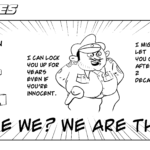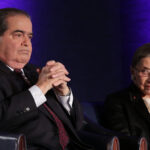The Crowns’s Fancy: A Look into the Doctrine of Pleasure (Part-II)
[The following article is the Part II of the series. Check out Part I here ]
Article 311
Though
doctrine of pleasure is accepted in India as it has developed in England, it
has not been completely accepted in India. It is subject to the provisions
of Article 311 which provides for procedural safeguards for civil
servants.
doctrine of pleasure is accepted in India as it has developed in England, it
has not been completely accepted in India. It is subject to the provisions
of Article 311 which provides for procedural safeguards for civil
servants.
Article 311
of the Constitution of India states that:
of the Constitution of India states that:
(1)
No
person who is a member of a civil service of the Union or an all-India service
or a civil service of a State or holds a civil post under the Union or a State
shall be dismissed or removed by an authority subordinate to that by which he
was appointed.
No
person who is a member of a civil service of the Union or an all-India service
or a civil service of a State or holds a civil post under the Union or a State
shall be dismissed or removed by an authority subordinate to that by which he
was appointed.
(2) No such person as aforesaid shall be dismissed or removed or reduced in
rank except after an inquiry in which he has been informed of the charges
against him and given a reasonable opportunity of being heard in respect of
those charges: Provided that where, it is proposed after such inquiry, to
impose upon him any such penalty, such penalty may be imposed on the basis of
the evidence adduced during such inquiry and it shall not be necessary to give
such person any opportunity of making representation on the penalty proposed:
Provided further that this clause shall not apply —
(a)
where
a person is dismissed or removed or reduced in rank on the ground of conduct
which has led to his conviction on a criminal charge; or
where
a person is dismissed or removed or reduced in rank on the ground of conduct
which has led to his conviction on a criminal charge; or
(b)
where the authority empowered to dismiss or remove a person or to reduce him in
rank is satisfied that for some reason, to be recorded by that authority in
writing, it is not reasonably practicable to hold such inquiry; or
where the authority empowered to dismiss or remove a person or to reduce him in
rank is satisfied that for some reason, to be recorded by that authority in
writing, it is not reasonably practicable to hold such inquiry; or
(c) where the President or the Governor, as the case may be, is satisfied that
in the interest of the security of the State it is not expedient to hold such
inquiry.
(3) If, in respect of
any such person as aforesaid, a question arises whether it is reasonably
practicable to hold such inquiry as is referred to in clause (2), the decision
thereon of the authority empowered to dismiss or remove such person or to
reduce him in rank shall be final.”[1]
any such person as aforesaid, a question arises whether it is reasonably
practicable to hold such inquiry as is referred to in clause (2), the decision
thereon of the authority empowered to dismiss or remove such person or to
reduce him in rank shall be final.”[1]
Restrictions/Limitations on the Doctrine of Pleasure
Under
Indian Constitution several restrictions has been placed on Doctrine
of Pleasure. They are as follows:
Indian Constitution several restrictions has been placed on Doctrine
of Pleasure. They are as follows:
(i) The
service contract entered between the civil servant and government may be
enforced.
service contract entered between the civil servant and government may be
enforced.
(ii) The
fundamental rights guaranteed under the constitution are restrictions on the
pleasure doctrine and therefore this doctrine cannot be resorted too freely and
unfairly, Articles 14, 15 and 16 of the Constitution imposed
limitations on free exercise of Pleasure Doctrine.
fundamental rights guaranteed under the constitution are restrictions on the
pleasure doctrine and therefore this doctrine cannot be resorted too freely and
unfairly, Articles 14, 15 and 16 of the Constitution imposed
limitations on free exercise of Pleasure Doctrine.
(iii)
A number of posts have been kept outside the scope of pleasure doctrine. Under
the constitution the tenure of the Judges of the High Courts and Supreme
court, of the comptroller and Auditor-General of India, of the Chief Election
Commissioner and the Chairman and Members of Public service commission is not
at the pleasure of the Government.[2]
A number of posts have been kept outside the scope of pleasure doctrine. Under
the constitution the tenure of the Judges of the High Courts and Supreme
court, of the comptroller and Auditor-General of India, of the Chief Election
Commissioner and the Chairman and Members of Public service commission is not
at the pleasure of the Government.[2]
Thus,
the general principle relating to civil services has been laid down
under Article 310 of the Constitution to the effect that
government servants hold office during the pleasure of the government
and Article 311 imposes restrictions on the privilege of dismissal at
the pleasure in the form of safeguards.
the general principle relating to civil services has been laid down
under Article 310 of the Constitution to the effect that
government servants hold office during the pleasure of the government
and Article 311 imposes restrictions on the privilege of dismissal at
the pleasure in the form of safeguards.
Persons Entitled To
Safeguard:
Safeguard:
Constitutional safeguards provided
under Article 311 are not available to all the government servants.
The constitution bench of the Supreme Court in S.L. Agarwal (Dr.) v. General
Manager, Hindustan Steel Limited[3],
generally considered as to who are the persons entitled to the protection
of Article 311. The Court identified the following persons:
under Article 311 are not available to all the government servants.
The constitution bench of the Supreme Court in S.L. Agarwal (Dr.) v. General
Manager, Hindustan Steel Limited[3],
generally considered as to who are the persons entitled to the protection
of Article 311. The Court identified the following persons:
(1) Persons
who are members of:
who are members of:
(a) A
civil service of the union; or
civil service of the union; or
(b) An
All India Service; or
All India Service; or
(c) A
civil service of a State; or
civil service of a State; or
(2) Hold
a civil post under the Union or State.
a civil post under the Union or State.
Supreme
Court in State of Assam v. Kanak Chandra Dutta[4]
laid down that civil post in Clause (1) means a post not connected with the
defence services and outside the regular civil services. Further,
in Parshottam Lal Dhingra v. Union of India[5],
the Supreme Court of India has held that under Article 311 the safeguards
are applicable to both permanent and temporary servants.
Court in State of Assam v. Kanak Chandra Dutta[4]
laid down that civil post in Clause (1) means a post not connected with the
defence services and outside the regular civil services. Further,
in Parshottam Lal Dhingra v. Union of India[5],
the Supreme Court of India has held that under Article 311 the safeguards
are applicable to both permanent and temporary servants.
Constitutional Safeguards Available To
the Civil Servants:
There
are two constitutional safeguards provided under Article 311 of the
Indian Constitution. They are as follows:
are two constitutional safeguards provided under Article 311 of the
Indian Constitution. They are as follows:
1.
Clause (1) of Article 311
addresses itself to the authority who can impose any of the punishments of
dismissal or removal. According to this, no order of dismissal or removal can
be made by an authority subordinate to the appointing authority. But if the
removing authority is of the same or co-ordinate rank or grade as the
appointing authority then, dismissal or removal by such authority is valid.[6]
Clause (1) of Article 311
addresses itself to the authority who can impose any of the punishments of
dismissal or removal. According to this, no order of dismissal or removal can
be made by an authority subordinate to the appointing authority. But if the
removing authority is of the same or co-ordinate rank or grade as the
appointing authority then, dismissal or removal by such authority is valid.[6]
2. Clause (2) of Article 311
provides the procedural essentials to be followed before dismissing, removing
or reducing in rank. Article 311(2) mandates the compliance of the
Principles of Natural Justice. A civil servant cannot be punished without: (a)
holding an enquiry; and (b) informing the civil servant about the charges
against him; and (c) giving him a reasonable opportunity of being heard in
respect of those charges.
Exceptions
to the Safeguards Provided Under Article 311:
to the Safeguards Provided Under Article 311:
The
provision to Article 311 (2) provides for certain circumstances in
which the procedure envisaged in the substantive part of the clause need not be
followed. These are as follows:
(a) Conviction on
Criminal Charge: The Supreme Court has emphasised under Art. 311(2)(a), the
disciplinary authority is to regard the conviction of the concerned civil
servant as sufficient proof of misconduct on his part. The authority is to
decide whether conviction demands the imposition of any penalty and, if so,
what penalty. For this purpose, the authority has to take into consideration
the judgement of the criminal court, the entire conduct of the civil servant,
the gravity of the offense, the impact of the offence on the administration,
whether the offence was of a technical or trivial nature, and extenuating
circumstances if any.
provision to Article 311 (2) provides for certain circumstances in
which the procedure envisaged in the substantive part of the clause need not be
followed. These are as follows:
(a) Conviction on
Criminal Charge: The Supreme Court has emphasised under Art. 311(2)(a), the
disciplinary authority is to regard the conviction of the concerned civil
servant as sufficient proof of misconduct on his part. The authority is to
decide whether conviction demands the imposition of any penalty and, if so,
what penalty. For this purpose, the authority has to take into consideration
the judgement of the criminal court, the entire conduct of the civil servant,
the gravity of the offense, the impact of the offence on the administration,
whether the offence was of a technical or trivial nature, and extenuating
circumstances if any.
(b) Impracticability: This clause applies
only when the conduct of government servant is such as he deserves the
punishment of dismissal, removal or reduction in rank. Before denying
government servant his constitutional right to an inquiry, the paramount
consideration is whether the conduct of the government is such as justifies the
penalty of dismissal, removal or reduction in rank.
only when the conduct of government servant is such as he deserves the
punishment of dismissal, removal or reduction in rank. Before denying
government servant his constitutional right to an inquiry, the paramount
consideration is whether the conduct of the government is such as justifies the
penalty of dismissal, removal or reduction in rank.
“whether it was
practicable to hold the inquiry or not must be judged in the context of whether
it was reasonably practicable to do so. It is not a total or absolute
impracticability which is required by cl. (b). What is requisite is that
holding of the inquiry is not practicable in the opinion of a reasonable man
taking a reasonable view of the prevailing situation.”
practicable to hold the inquiry or not must be judged in the context of whether
it was reasonably practicable to do so. It is not a total or absolute
impracticability which is required by cl. (b). What is requisite is that
holding of the inquiry is not practicable in the opinion of a reasonable man
taking a reasonable view of the prevailing situation.”
The Supreme Court further held that the reasonable
practicability of holding an inquiry is a matter of assessment to be made by
the disciplinary as he is the best judge of the situation.
practicability of holding an inquiry is a matter of assessment to be made by
the disciplinary as he is the best judge of the situation.
(c) Reasons
of Security: The satisfaction has to be that of the President or the
Governor as the case may be. The satisfaction must be with respect to the
expediency or inexpediency of holding an inquiry in the interest of the
security of the State. In Tulsiram Patel case the Supreme
Court has clarified that the question is not whether the security of the State
has been affected or not, for the expression cl(c) is “in the interest of the
security of State”. The interest of security of State may be affected by actual
act, or even the likelihood of such acts taking place. So the Court has
observed:
of Security: The satisfaction has to be that of the President or the
Governor as the case may be. The satisfaction must be with respect to the
expediency or inexpediency of holding an inquiry in the interest of the
security of the State. In Tulsiram Patel case the Supreme
Court has clarified that the question is not whether the security of the State
has been affected or not, for the expression cl(c) is “in the interest of the
security of State”. The interest of security of State may be affected by actual
act, or even the likelihood of such acts taking place. So the Court has
observed:
“What is required under
cl.(c) is not the satisfaction of the President or the Governor, that interest
of the security of the State is or will be affected but his satisfaction in the
interest of security of State, it is not expedient to hold an inquiry as
contemplated by Article 311(2)”.
cl.(c) is not the satisfaction of the President or the Governor, that interest
of the security of the State is or will be affected but his satisfaction in the
interest of security of State, it is not expedient to hold an inquiry as
contemplated by Article 311(2)”.
Conclusion
Thus it is
obvious that the discrepancies of corruption creeping into civil services were
apprehended by the makers of the Constitution. It can be said that
the Constitution makers then at that time had known about the
discrepancies like corruption to creep into the civil services, so they did not
grant immunity from summary dismissal to dishonest or corrupt government
servants. Also at the same time the judiciary with its limited judicial review
and has ensured that the power to dismiss has not been misused by the
authority. With many cases coming into light and also the ones discussed
above in relation to corruption among the government officials and the cases of
many government officials being linked with anti-social elements
the Article 310 and 311 of the Indian Constitution envisaged in
the Part XIV provides a means of check and balance so that the government
officials do not make a mockery of Law.
obvious that the discrepancies of corruption creeping into civil services were
apprehended by the makers of the Constitution. It can be said that
the Constitution makers then at that time had known about the
discrepancies like corruption to creep into the civil services, so they did not
grant immunity from summary dismissal to dishonest or corrupt government
servants. Also at the same time the judiciary with its limited judicial review
and has ensured that the power to dismiss has not been misused by the
authority. With many cases coming into light and also the ones discussed
above in relation to corruption among the government officials and the cases of
many government officials being linked with anti-social elements
the Article 310 and 311 of the Indian Constitution envisaged in
the Part XIV provides a means of check and balance so that the government
officials do not make a mockery of Law.




I enjoyed this post very much, such a out standing post.I was also searching related stuff from long time.You have solved my problem.Thanks for sharing this great stuff with us.